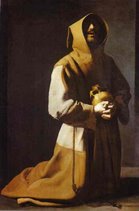The sense of unhappiness is so much easier to convey than that of happiness. In misery we seem aware of our own existence, even though it may be in the form of a monstrous egotism: this pain of mine is individual, this nerve that winces belongs to me and to no other. But happiness annihilates us: we lose our identity. The words of human love have been used by the saints to describe their vision of God, and so, I suppose, we might use the terms of prayer, meditation, contemplation to explain the intensity of the love we feel for a woman. We too surrender memory, intellect, intelligence and we too experience the deprivation, the noche oscura, and sometimes as a reward a kind of peace.
The End of the Affair (1951) by Graham Greene

4 comments:
I so needed to read that.
With all the cares of life, sometimes I forget.
What a joy it all is!
How did you guys like the opera?
Hey Sean,
A.V. is leaving it up to me to provide the review, so here goes: great singing, good music, really nice sets (most surprising considering the sparsity of opera sets these days), but because I'm a snob, I had problems with it.
First, I really hate decisions to show performers in their underwear in performance arts media that are highly stylized. It just rings really false to me and eliminates some of the suspension of disbelief that goes on when listening to people communicating in a way that no one does 'in real life,' yet they are in nothing but undergarments.
Second, I've read Greene's novel, and the nature of it, with Maurice's questioning of God and Sarah's surrender to Him, doesn't come off easily on the stage in the way it does in the novel, nor could it. I remember thinking in the second act that a love triangle is a great conceit for opera - a soprano and two male voices, a chord - that's great stuff (and please, cut out Sarah's mother!), but the moral elements of Greene's novel can't be easily translated. I wished that it had just been a straight forward love triangle, like the kind that have been amusing soap opera viewers (including myself) for decades, without the religious angst and questioning. Maybe it's also just really hard to communicate piety in modern opera. One can make the singers have to 'act' too much, and not through just their voices.
Some of Jake Heggie's music sounded like it was from musical theater (nothing wrong with that, especially during the moments that it sounded like Weill), but there weren't any easy motifs to hold on to for each character, or situation. Nothing wrong with that either, except when one's music sounds similar to that in musical theater which does have such motifs. Heggie's music is interesting, I just feel the material of the novel is not appropriate for adaptation opera, so it seems he got mired down in how to convey complex character motivations and back stories - I might have preferred listening to it with NO story attached. And it was alot a bit too long.
But I did like it, I'm just more likely to be discontented at ANY performance - I'm such a critic. But we did have a good time, and as I said before, I thought the sets were cool. Thanks for the tickets!
Yeah, what AG said.
(I am rather incompetent as a reviewer. I'd like to think that some of the time I know my limitations. That way I don't stick my foot that far in my mouth...)
Post a Comment